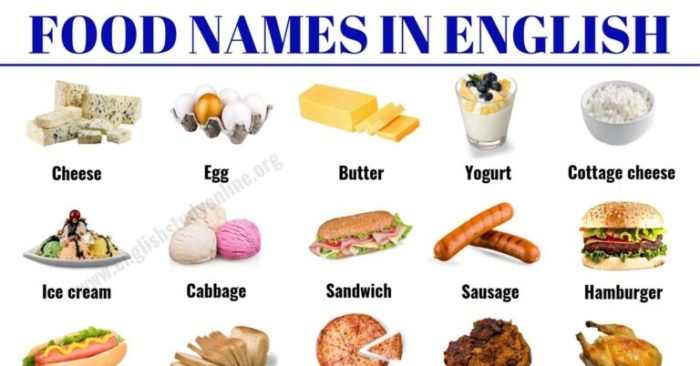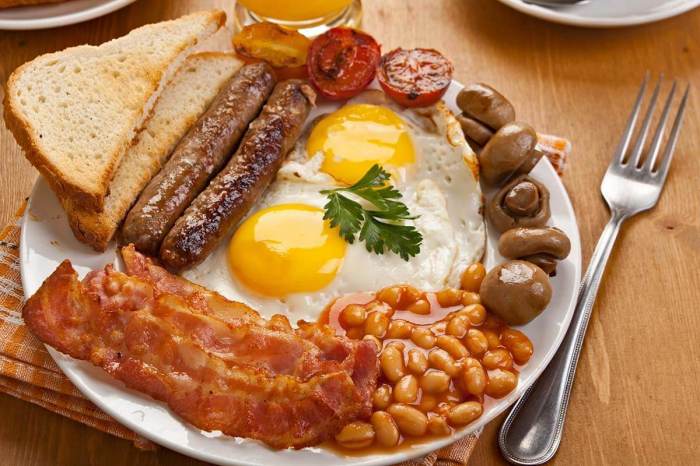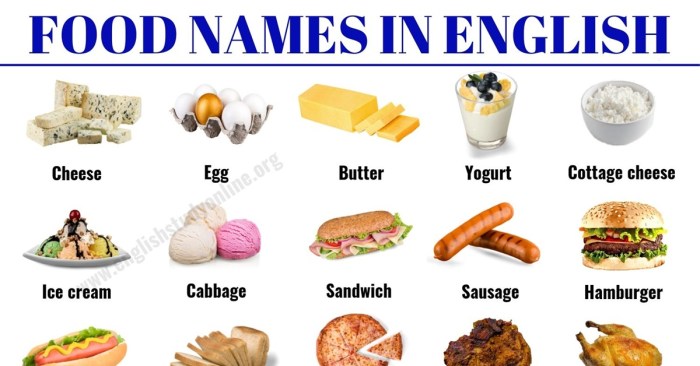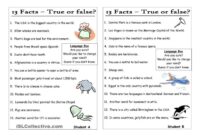Contoh makanan dalam bahasa inggris – Pernahkah Anda ingin memesan makanan di restoran luar negeri, tapi bingung dengan nama-namanya dalam bahasa Inggris? Atau mungkin Anda ingin mencoba membuat resep baru, tetapi kesulitan memahami instruksinya? Jangan khawatir, artikel ini akan memandu Anda menjelajahi dunia makanan dalam bahasa Inggris dengan mudah dan menyenangkan.
Dari daftar makanan pokok hingga ekspresi sehari-hari yang berkaitan dengan makanan, kita akan membahas berbagai aspek penting yang akan membantu Anda menguasai bahasa Inggris di dapur dan di meja makan. Mari kita mulai!
Percakapan di Restoran
Saat berkunjung ke restoran, kita akan berinteraksi dengan pelayan untuk memesan makanan. Berikut adalah contoh percakapan sederhana antara pelayan dan pelanggan di restoran, menggunakan nama makanan dalam bahasa Inggris.
Contoh Percakapan di Restoran
Berikut adalah contoh percakapan sederhana antara pelayan dan pelanggan di restoran:
Waiter: “Good evening, welcome to our restaurant. How many people are in your party?”
Customer: “Good evening, we are a party of two.”
Waiter: “Follow me, please. Here is your table.”
Customer: “Thank you.”
Waiter: “Can I get you anything to drink?”
Customer: “Yes, I’ll have a glass of water, please. And my friend will have a [nama minuman].”
Waiter: “Okay, I’ll be right back with your drinks. And what can I get you to eat?”
Customer: “I’d like to have the [nama makanan], please. And my friend will have the [nama makanan].”
Waiter: “Okay, I’ll bring your order soon. Enjoy your meal!”
Pertanyaan yang Ditanyakan Pelayan kepada Pelanggan
Pelayan biasanya akan menanyakan beberapa pertanyaan kepada pelanggan untuk memastikan pelayanan yang baik. Berikut adalah 3 contoh pertanyaan yang bisa ditanyakan oleh pelayan kepada pelanggan di restoran:
- What would you like to drink?
- Are you ready to order?
- Would you like anything else?
Kalimat yang Digunakan Pelanggan untuk Memesan Makanan
Pelanggan dapat menggunakan berbagai kalimat untuk memesan makanan di restoran. Berikut adalah 3 contoh kalimat yang bisa digunakan oleh pelanggan untuk memesan makanan di restoran:
- I’ll have the [nama makanan], please.
- I’d like to order the [nama makanan].
- Can I get the [nama makanan], please?
Informasi Nutrisi Makanan

Makanan yang kita konsumsi setiap hari memiliki nilai nutrisi yang berbeda-beda. Mengetahui informasi nutrisi makanan penting untuk menjaga kesehatan dan mencapai kebutuhan nutrisi tubuh. Berikut adalah beberapa informasi nutrisi dari beberapa makanan umum.
Informasi Nutrisi Makanan, Contoh makanan dalam bahasa inggris
| Nama Makanan | Kalori | Protein (gram) |
|---|---|---|
| Nasi Putih | 130 kalori | 3 gram |
| Telur Ayam | 78 kalori | 6 gram |
| Daging Sapi | 240 kalori | 27 gram |
| Ikan Salmon | 206 kalori | 22 gram |
| Brokoli | 34 kalori | 3 gram |
Beberapa contoh makanan yang mengandung banyak protein dalam bahasa Inggris adalah:
- Chicken
- Fish
- Beans
Beberapa contoh makanan yang mengandung banyak serat dalam bahasa Inggris adalah:
- Fruits
- Vegetables
- Whole grains
The History of Food

Food has been a fundamental part of human existence since the dawn of time. From our earliest ancestors foraging for sustenance to the complex culinary traditions of today, food has shaped our cultures, societies, and even our very biology. Understanding the history of food allows us to appreciate the journey of human ingenuity and the profound connection we have with the natural world.
Examples of Foods with a Long History
Many foods we enjoy today have a long and fascinating history, dating back centuries or even millennia. Here are three examples:
- Bread: The oldest known bread dates back to 10,000 BC, discovered in the Natufian culture of the Near East. This early form of bread was likely made from wild grains and cooked on hot stones. Over time, breadmaking evolved with the development of agriculture and the domestication of wheat and barley. Different cultures developed their own unique bread traditions, from the crusty baguettes of France to the fluffy naan of India.
- Cheese: Evidence suggests that cheesemaking originated around 8,000 BC in the Middle East. It is believed that nomadic tribes discovered that milk would curdle naturally in animal stomachs, leading to the creation of cheese. Cheesemaking spread throughout the world, with different cultures developing their own unique varieties, from the creamy Brie of France to the sharp Cheddar of England.
- Beer: The earliest known evidence of beer brewing dates back to 7,000 BC in Mesopotamia. It is believed that beer was originally made from barley and was an important part of social life. Beermaking traditions spread throughout the world, with different cultures developing their own unique recipes and styles, from the light lagers of Germany to the dark stouts of Ireland.
The History of Pizza
Pizza, a beloved dish around the world, has a long and rich history that spans centuries. Its origins can be traced back to ancient civilizations in the Mediterranean region, where flatbreads topped with various ingredients were common.
In Naples, Italy, during the 18th century, the modern pizza as we know it began to take shape. Street vendors in Naples started selling flatbreads topped with simple ingredients like tomato sauce, cheese, and herbs. These early pizzas were popular among the working class and quickly gained popularity throughout the city.
The 19th century saw the rise of pizzerias in Naples, and pizza became increasingly sophisticated with the addition of new toppings and ingredients. The invention of the wood-fired oven in the early 20th century further revolutionized pizza making, allowing for a crispy crust and evenly cooked toppings.
Pizza’s popularity spread beyond Naples and Italy in the 20th century, becoming a global phenomenon. Today, pizza is enjoyed in countless variations around the world, with each region and culture adding its own unique twist to this beloved dish.
The History of Sushi
Sushi, a Japanese culinary art form, has a long and fascinating history that dates back centuries. Its origins can be traced to Southeast Asia, where fermented fish was wrapped in rice as a method of preservation.
In the 7th century, the practice of fermenting fish in rice was introduced to Japan, where it evolved into a culinary tradition. During the Edo period (1603-1868), sushi began to transform into the dish we know today. The use of vinegar in the rice was introduced, and sushi became a popular street food in Edo (modern-day Tokyo).
In the late 19th century, sushi was popularized in Tokyo by chef Hanaya Yohei, who introduced the concept of “nigiri-zushi,” where small pieces of fish were placed on top of vinegared rice. This innovation revolutionized sushi and laid the foundation for the modern sushi we enjoy today.
Sushi has become a global culinary icon, with its intricate techniques and fresh flavors capturing the imaginations of food enthusiasts around the world. From traditional Edomae-style sushi to modern fusion creations, sushi continues to evolve and delight palates across the globe.
Pemungkas: Contoh Makanan Dalam Bahasa Inggris

Dengan memahami contoh makanan dalam bahasa Inggris, Anda tidak hanya dapat menikmati pengalaman kuliner yang lebih kaya, tetapi juga meningkatkan kemampuan berbahasa Inggris Anda. Jadi, jangan ragu untuk mencoba berbagai makanan baru, berlatih mengucapkan nama-namanya, dan jangan lupa untuk selalu mengeksplorasi dunia kuliner yang menarik!






